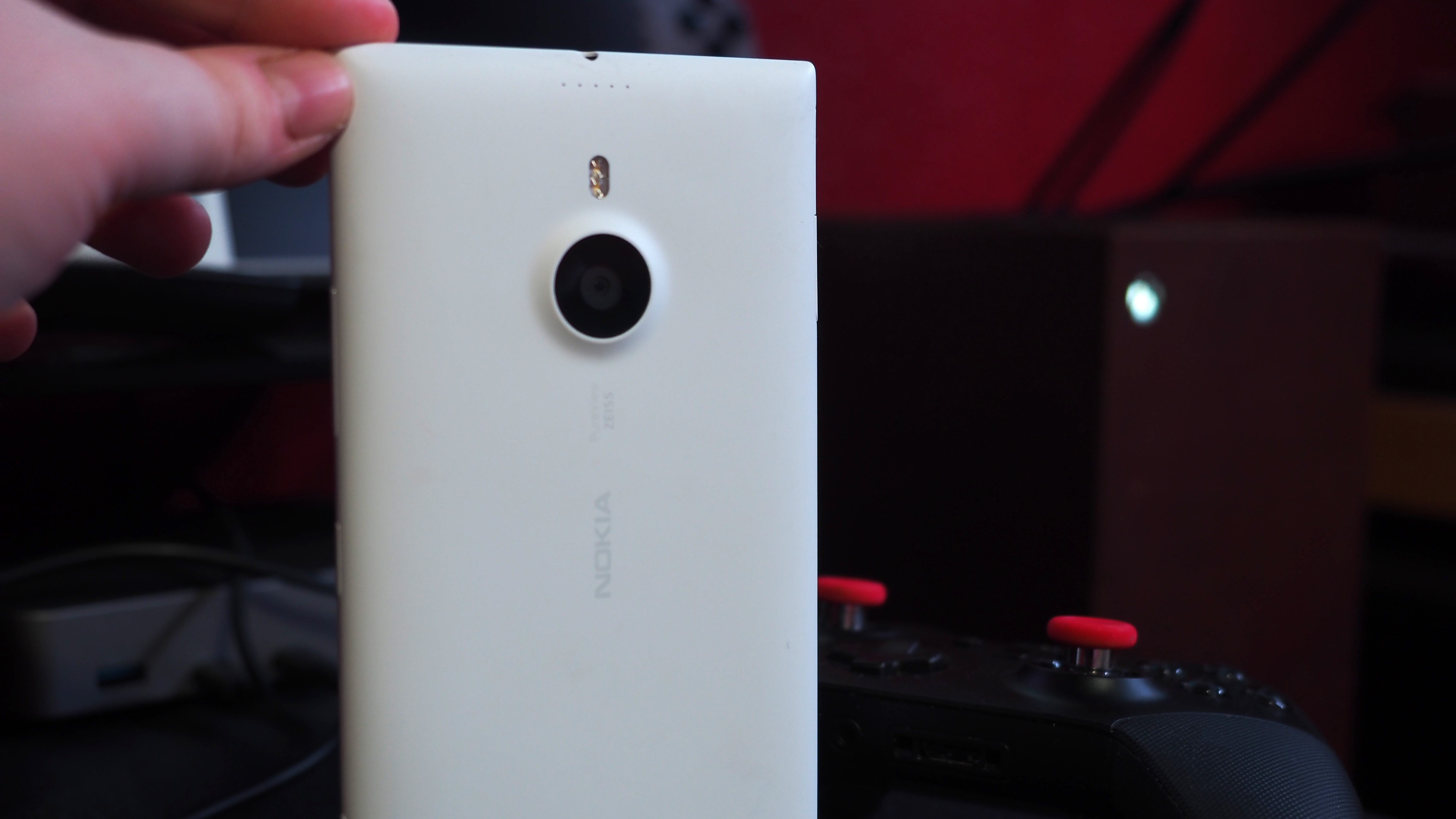
The past few weeks, rumors began to swirl about the future of Xbox, and its plans for multiplatform games.
I went into some of the outrage here, and why Xbox fans are right to doubt Microsoft's plans here. Microsoft is reportedly exploring putting its Xbox exclusives onto long-time rival, PlayStation.
Yes, there are elements of console war tribalism, and some have been utterly toxic in attacking and harassing people on social media to that effect, which is wholly unacceptable. Nobody in their right mind thinks it's a bad thing for devs to get their art out to a wider audience, but this multi-platform plan implies a one way street, potentially harming Xbox's competitive position against its rivals. The broader concerns are valid, and logical — if Microsoft reduces the reasons to buy an Xbox, less people will buy Xbox, less developers will develop for Xbox, preceding less reasons to buy an Xbox. Xbox goes into a death spiral, and thus, long-term, customers lose access to potentially hundreds or even thousands of dollars worth of digital game investments. I don't know why some find this point hard to understand, but it's not necessarily relevant to today's article.
Today, we're exploring why active Xbox consumers don't trust Microsoft with this "plan," and how Satya Nadella's Microsoft jeopardises its entire operation beyond gaming with short-sighted, quick-money decisions that erode long-term trust in its products and services.
Microsoft has a ton of consumer-harming baggage
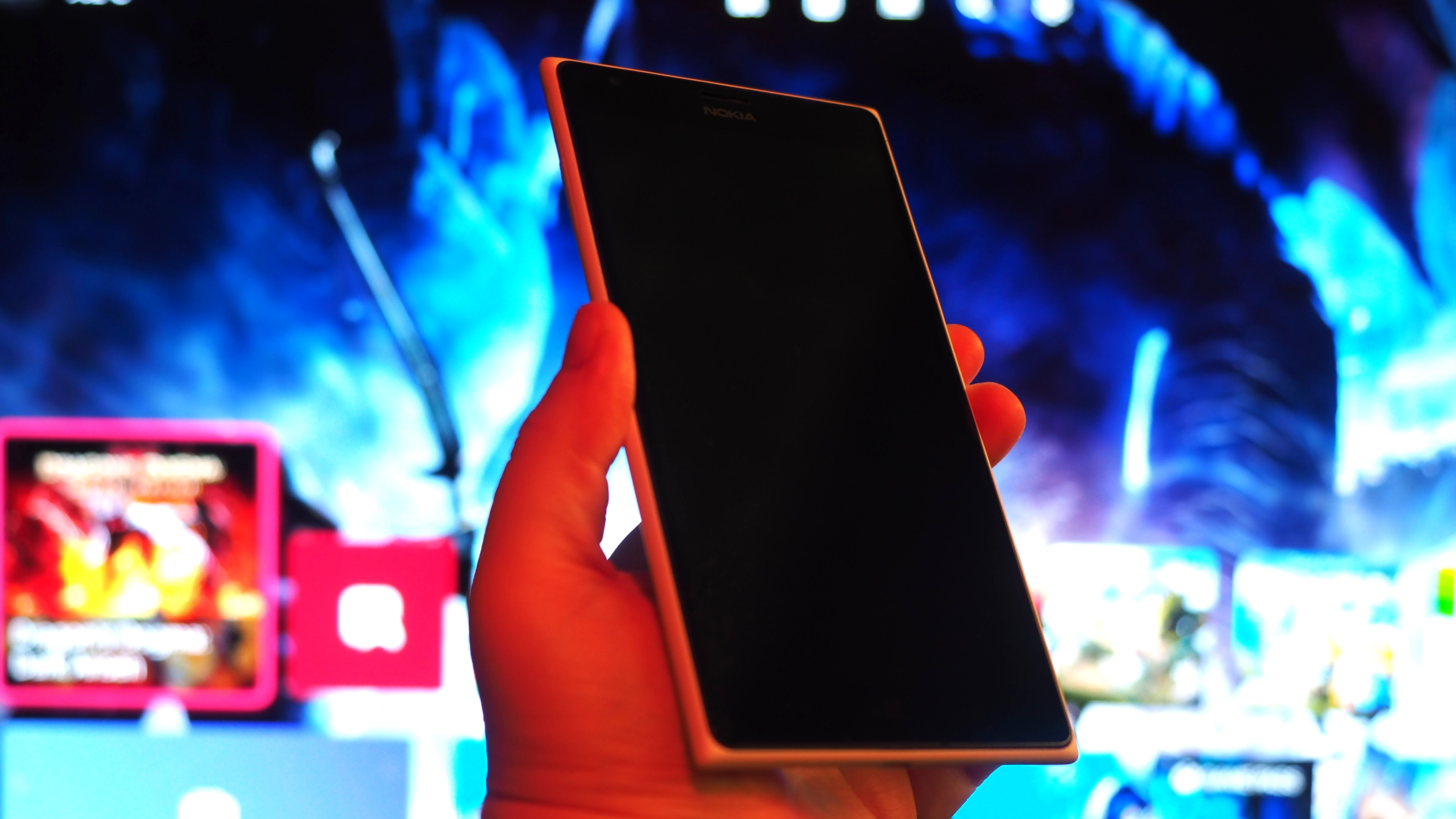
A firestorm of speculation has YouTubers and popular Xbox influencers proclaiming the Xbox platform "dead," posting receipts of traded-in Xbox consoles and games, and even suggesting Xbox is going bankrupt — despite Microsoft posting record gaming revenue, and even record Xbox console gaming engagement, just last week. Yes, PlayStation 5 is outselling Xbox Series X|S, but potentially only to its own PS4 install base. The fact Microsoft's console user base is going up, while the overall console market remains static, certainly doesn't suggest a broad swath of Xbox users switching their platform of choice. Assuming all the figures are accurate, Microsoft maybe comfortable not giving Xbox One users a reason to upgrade. But games like Grand Theft Auto 6 which is next-gen only may begin to change their fortunes here.
But again, I digress. Why the outrage? Why the fearmongering, and why the apocalyptic prognostications? I have to admit that I initially felt the same way through all of this, as a long-time Xbox user with thousands of dollars invested into the box. But I know all too well why I don't exactly trust the upper echelons of Microsoft to have their customer's best interests at heart.
We're listening and we hear you. We've been planning a business update event for next week, where we look forward to sharing more details with you about our vision for the future of Xbox. Stay tuned.February 5, 2024
Long time readers of Windows Central (formerly WPCentral, as in Windows Phone Central) will know exactly what I'm talking about. For years, Microsoft actively curated a community and fandom around its Windows Phone platform. They celebrated by giving out Lumia phones to developers at Build events, encouraging developers to create apps and services. They had community programs, similar to the Xbox FanFest, around developers and phone enthusiasts. They'd engage phone photographers, tech influencers, digital artists. They would hold events at Mobile World Congress much like E3, to launch new phones, products, and services. They would do Lumia product placements in TV shows and movies. They even bought Nokia's phone division, for billions, analogous to Xbox's acquisitions in recent years. CEO Satya Nadella even did a photo op with Nokia CEO Stephen Elop to celebrate the acquisition, and the teams therein joining Microsoft.
And then, Microsoft killed Windows Phone. With a tweet.
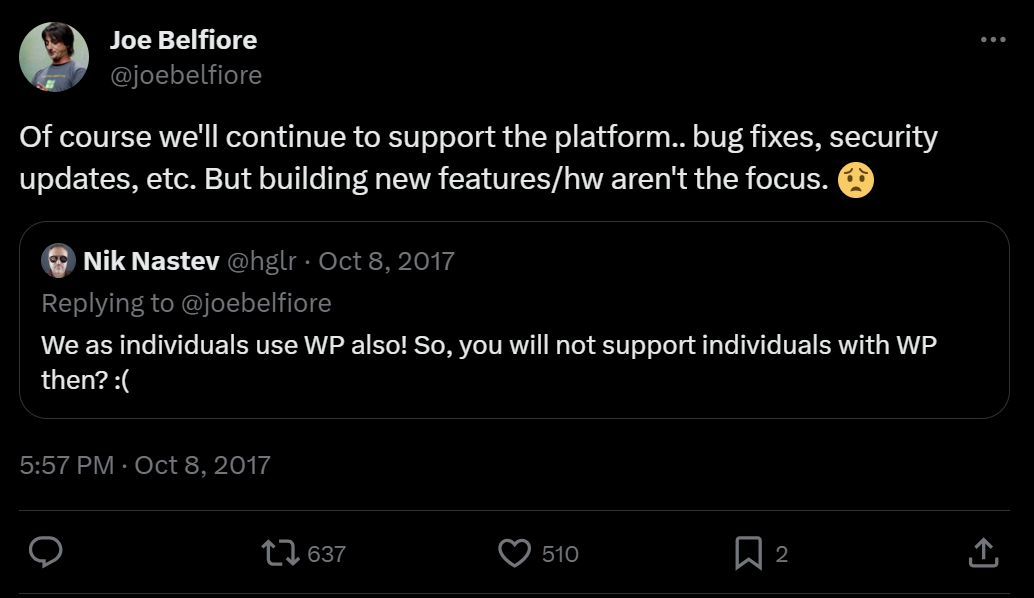
For all of Microsoft's general lack of consistency, they are at least consistent when it comes to disappointment. CEO Satya Nadella loves to drop buzzwords like "A.I." and "metaverse" when its the current tech trend, only to never follow through with any plans in any sort of serious context. The only thing keeping HoloLens alive, which was half a decade ahead of Apple's Vision Pro, is a quite probably doomed U.S. Department of Defence contract. People are literally willing to wear Apple's dumb $3500 dollar headset in public, which practically does all all the same things HoloLens did — and why? Because Apple has consumer's trust. People know Apple will see things through, and they know Apple will reward early adopters.
Microsoft is a product killer. Skype, HoloLens, Microsoft Band, Mixer, Surface Duo and Neo, Windows Phone, the entire phone division, probably Surface itself in the coming years — on paper, Xbox is doing better than ever, but nobody believes that it'll ever be enough for Microsoft.
Microsoft either doesn't see it, or doesn't care
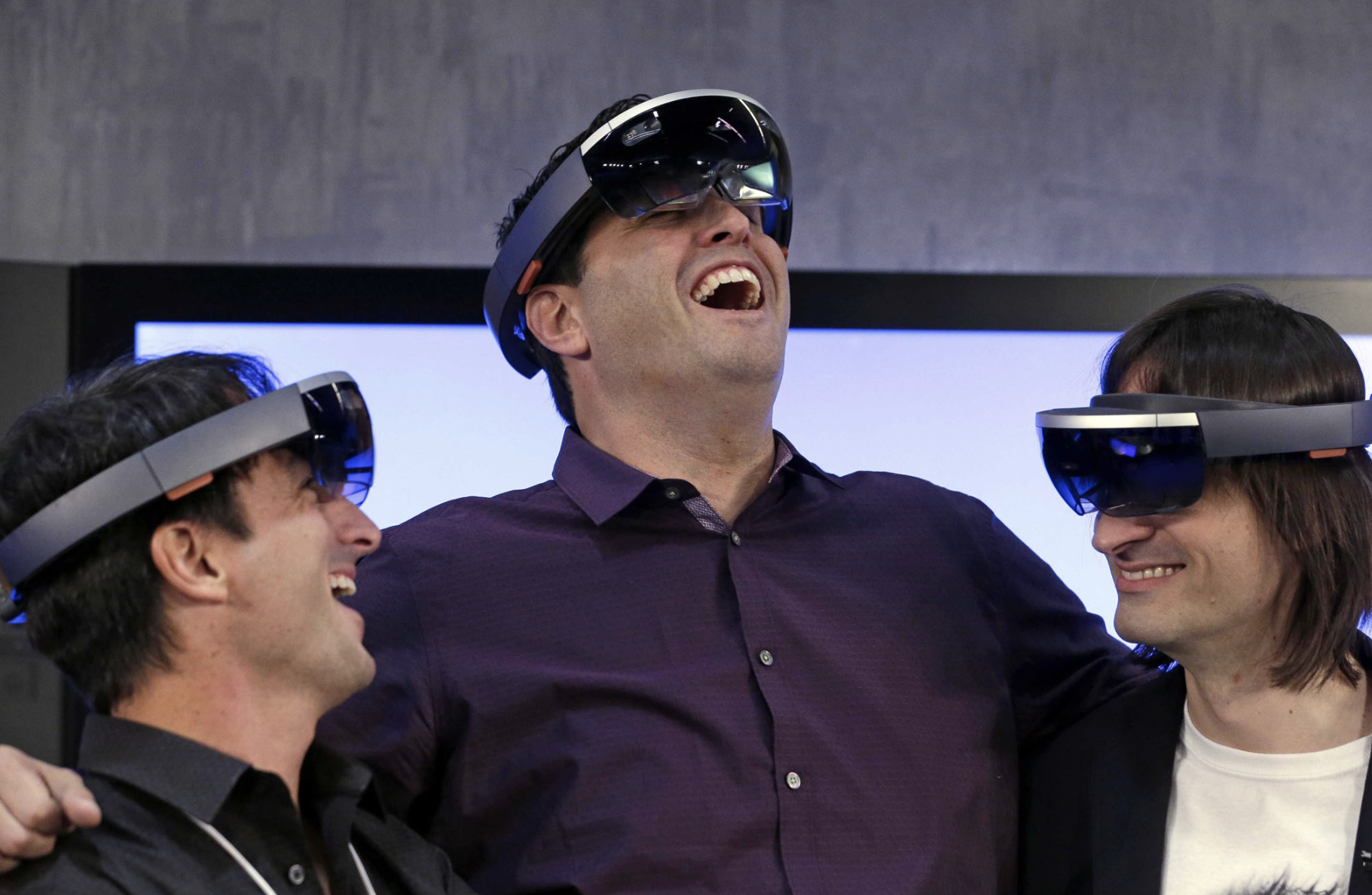
The A.I. hype train currently has Microsoft sitting at a $3 trillion dollar market cap, but Microsoft is basically piggy backing on OpenAI to do a lot of the heavy lifting here. I wrote previously about why I don't think Microsoft will be the ones to mainstream consumer-oriented applications of A.I., and I'm essentially echoing some of the sentiments here. But the latest tech hype really rammed the point home for me this week.
Apple launched an absurd $3,500 face computer recently, called the Apple Vision Pro. It's analogous to HoloLens in almost every conceivable way. Beyond gimmicks, the Apple Vision Pro's primary use case is spatial anchors for app/program windows, a feature literally pioneered by Windows Mixed Reality and the HoloLens team.
People are literally walking around in public wearing the Apple Vision Pro. Can you imagine people doing the same with HoloLens? Probably not, because nobody actually bought them. It even has a Netflix app, unlike the Apple Vision Pro. People didn't buy HoloLens because Microsoft didn't truly believe in it, and pretty much dropped all interest in it at the first opportunity.
when you're in the club but you need to participate in the latest twitter video game discourse pic.twitter.com/PNIubv8It2February 5, 2024
I remarked on Twitter (X) the other day that "HoloLens creators must be quite mad that Apple just invented HoloLens several years later." A former HoloLens engineer reached out to me and said "we're not mad, because half of us left to join Apple to create the Vision Pro." I realized then that, Satya Nadella's Microsoft might have squandered the next big wave of consumer computing. You sure as hell can't use a Windows PC if you have an Apple Vision Pro strapped to your face, much in the same way iPads and iPhones are introducing millions to Apple's walled garden as the "default" computing experience.
Whether or not the so-called "metaverse" becomes a multi-billion dollar black hole fad remains to be seen. But imagine if it isn't? Meta is sinking billions into making it a thing, and its share price is gradually trending up right now. Microsoft was literally the first to this kind of tech — true augmented reality, standalone, cable-free, spatial anchors — in the palm of its hand, but always lacked the long-term vision and corporate competitive balls to see it through.
Apple has curated a supply of consumer trust and consistency that is truly the envy of the world over — you know exactly what you're getting with an Apple product, and that reliability, and that familiarity, is why Apple is utterly dominant when it comes to consumer electronics. They are supplanting Samsung as the world's primary smartphone manufacturer on the back of this consumer trust and prestige, selling electronics at a hard premium while raking it in from developers in the process. Apple's entire marketing strategy revolves around curating trust, from its "privacy-led" marketing to its aggressively consistent and familiarity-first iterative design strategy.
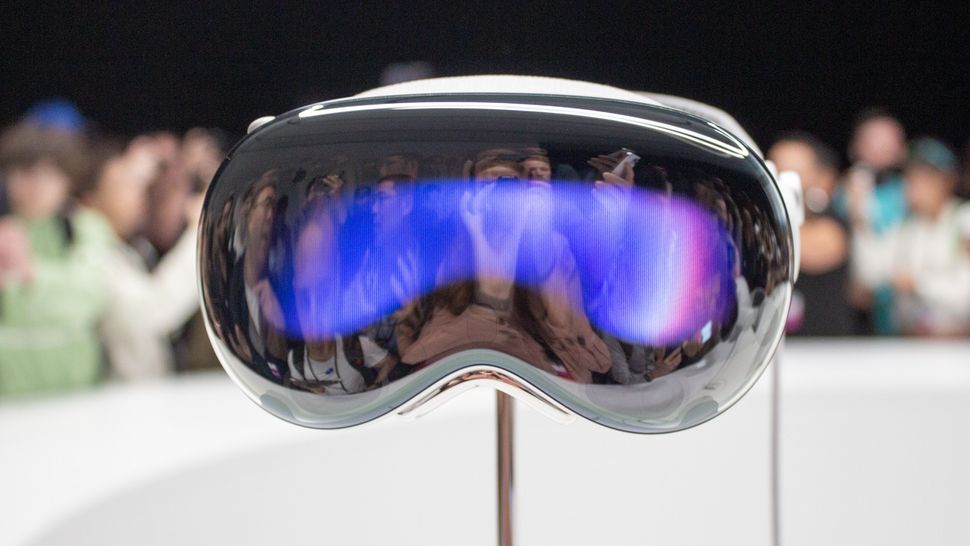
It's intensely frustrating, because Microsoft "being first, then quitting" is absolutely a meme at this point, and the lack of foresight is precluding the company from vast swaths of coming tech trends. Perhaps the metaverse and augmented reality are the next big wave in computing — but Windows Mixed Reality is now very, very dead. Microsoft has no play in that space now, and will be at the mercy of Apple and Meta's walled gardens, losing control of their services and the default apps on those platforms. The lack of a Windows-first mobile experience also precludes Microsoft's efforts in A.I., business applications and services, web browsers, search engines, and yes, you guessed it, Xbox gaming too — Microsoft announced that it now has 200 million monthly active mobile gamers, and that empire is wholly at the mercy of the whims of Apple and Google's app store rules. Good luck with that, ladies and gentlemen.
Microsoft has already complained about Apple's mobile store rules as recently as last week. Imagine if they had their own mobile platform to speak of, so they wouldn't need to worry about such things eating into their bottom line?
But again, I digress. There's no hope for Microsoft to build a new computing platform in 2024, because people simply don't trust Microsoft to see this kind of stuff through. I firmly believe Xbox Series X|S is the best product Microsoft has ever built. It works flawlessly as advertised, has a sleek and speedy interface, and has given me thousands of hours of affordable entertainment — it even gave me a career. But I'd have to be insane to truly believe Microsoft has my best customer interests at heart when making some of the decisions it makes, based on decades of inconsistency, and mistrust.
Microsoft's consumer products will succeed, and make *more* money, with a more consistent behavior pattern
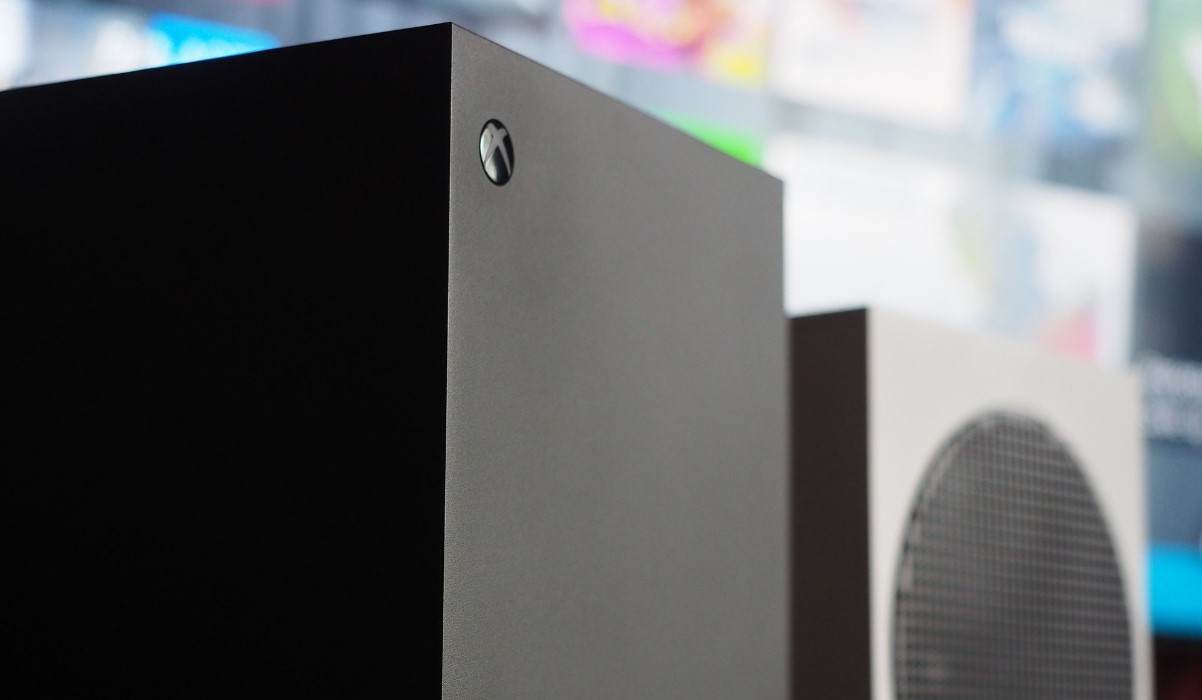
If Microsoft has a company tracking consumer sentiment and trust around its brand, they should probably fire them. Microsoft's spectacular inability to "read the room" will continue to harm the firm well beyond just Xbox. I suspect consumers will prefer other platform's A.I. efforts over Bing and Microsoft Copilot, regardless of what their companies force upon them in the future. Qualitatively, the subreddits dedicated to A.I. are often awash with mockery for how overly-sensitive and erroneously censorship-prone Microsoft Copilot A.I. is when compared to regular ChatGPT.
The staggeringly negative reaction to the mere whispers of Microsoft maybe jeopardizing the Xbox hardware platform is wholly a drama of Microsoft's own making.
I have no crystal ball and have no idea what the future holds. I want to believe that Xbox would be fine even if it went multi-platform (and hey, Steam is building Steam Deck console-like devices using PlayStation and Xbox PC games already anyway). Xbox's revenue and outlook is better than it ever was during the Xbox 360 era, on paper. I want to believe Xbox will make a Steam Deck / Nintendo Switch-like handheld, and will continue to support its hardware ecosystem for decades to come. But why should I? Gaming is going to have a troubled few years, but I feel like if it was Apple in this situation, they would subsidize the experience using their healthier operations to weather the storm to maintain that consumer trust. Microsoft's corporate mentality of "every division stands alone" is why they have a huge graveyard of products that is too long to list out here.
I don't want to downplay Satya Nadella and his team's accomplishments in business, nor their investments in Xbox and the team there. But, the overarching lack of faith in their own products, and a willingness to follow through, is just hard to deny.
Once upon a time, Satya Nadella said that he wanted people to go from just using Windows, to loving Windows. I've not really seen him make any efforts to achieve that — baking in ads, dark patterns, and telemetry harvesting. He also talked a lot about the metaverse, before culling the teams working on HoloLens and Mixed Reality. He talked a lot about Mixer too. And Surface. And Windows Phone. And probably other products I forgot about, long rotting in the Microsoft Graveyard.
An open letter to Microsoft: Consumers don't listen to what corporations say. Consumers watch what you do. Imagine what it would be like if consumers could trust you?







